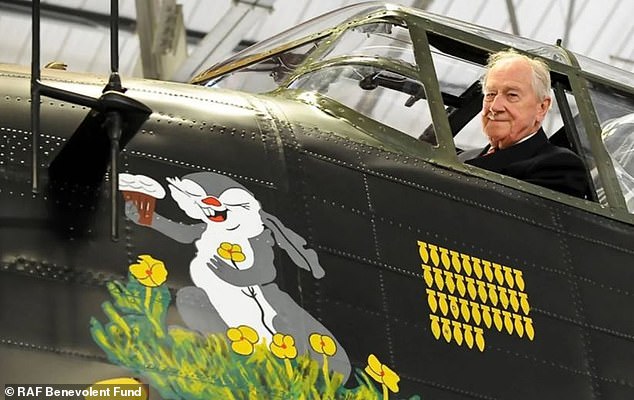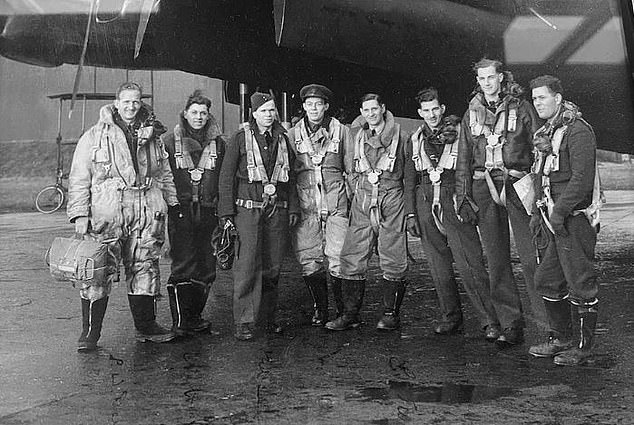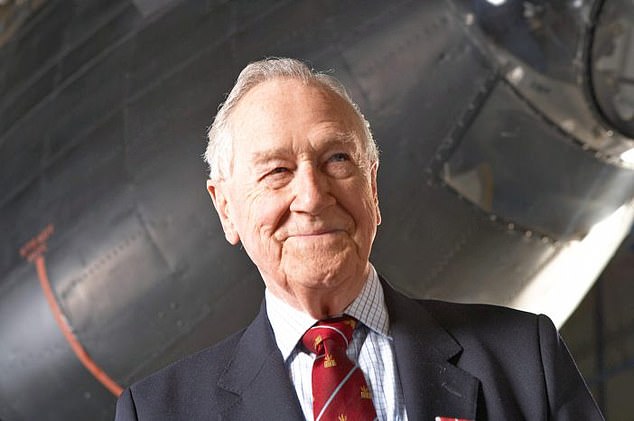- John Bell joined 617 Squadron with his pilot in 1944 after the famous raid
- They were involved in several daring missions prior to the D-Day landings
<!–
<!–
<!– <!–
<!–
<!–
<!–
The last remaining member of the wartime ‘Dambusters’ squadron has died just a week before he was due to celebrate his 101st birthday.
Wing Commander John Bell was a World War II bombardier attached to 617 Squadron, which was among Bomber Command’s most elite aircrew.
Bell, who did not fly the squadron’s most famous mission, was a very important member of the unit later in the war.
His squadron was ‘grounded’ for a month before D-Day so they could train for a very important mission which would convince the Germans that the invasion was taking place further south along the French coast at Calais rather than Normandy .
Operation Taxable saw the squadron drop bundles of aluminum foil – known as the ‘window’ over the sea between Newhavan and Cap d’Antifer – at timed intervals to convince German radar stations that the invasion fleet was heading for a point further along the French coast – leaving the road clear for the D-Day landings in Normandy.

Wing Commander John Bell was a World War II bombardier attached to 617 Squadron, which was among Bomber Command’s most elite aircrew


Bell, pictured second from right, was too tall at 6ft 4 to train as a pilot but became a bomb aimer instead


Wing Commander Bell, pictured, served in the RAF until his retirement in the 1970s
After the highly successful mission, the squadron was tasked with more conventional but highly skilled tasks such as striking a vital railway tunnel at Saumur, south-west of Paris.
The squadron was equipped with Barnes Wallis’ latest invention, the 12,000 lb ‘Tallboy’ deep penetration bomb.
Barnes Wallis was the genius who invented the bouncing bomb used to such devastating effect in the Dam Busters raid.
The attack on the railway junction severely limited the Germans’ ability to send more troops to defend Normandy, aiding the Allied invasion of Europe.
Later, Bell used the ‘Tallboy’ bomb to great effect when attacking a V2 rocket site which was becoming operational outside Calais.
He released 12,000 pounds of ammunition at the site in Wizernes, Pas de Calais on 17 July.
The impact destroyed part of the quarry where the rockets were to be released.
Two months later in August 1944, after completing 50 missions, he was rested after being awarded a Distinguished Flying Cross.
At the start of the war, Bell, who was too young to serve in the military, worked for a firm of chartered accountants in the City of London, but later volunteered for the Home Guard.
At 6ft 4, he was considered too tall to train as a pilot when he joined the RAF at 18. Instead, he was trained as an observer in South Africa.
He began his RAF career in 1943 flying with pilot Bob Knights, where they attacked targets in Hamburg, Essen and eight times to Berlin.
His crew joined the Dambusters squadron in January 1944 ahead of the D-Day landings.
After the war he was involved in the 1947 Berlin Air Lift and later worked in intelligence, retiring from the RAF in 1977.



